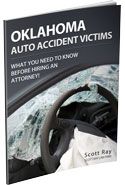
Driving without a License--Consequences
Most people believe that if someone is driving without a license and they are involved in a crash, that person is responsible. After all, they should not have been driving and if they had been following the law (by not driving), the crash would not have occurred. It is common sense, right? Not so fast.
The Oklahoma Supreme Court has held that the mere presence or absence of a license is not considered the legal cause of a crash. The Court basically disregards the idea that the crash would never have happened if the unlicensed driver had not been on the road. Instead, the Court looks to the actual, immediate, cause of the crash (running a stop light, failing to stop and read-ending a car, etc.). Thus, if you ran a stop sign and were broadsided by an unlicensed driver, you are the one at fault in the eyes of Oklahoma law.
However, there might be an exception to that long-standing rule of law. The Scott Ray Law Firm was contacted by the family of a person (we’ll call him Joe) that was broadsided and killed in a crash. Joe ran a stop sign and was broadsided by an unlicensed driver. The highway patrol investigated the fatality crash and determined that the deceased individual, Joe, had run the stop sign causing the crash. In other words, under Oklahoma law according to the highway patrol, the deceased Joe was the actual, immediate, cause of the crash. Notwithstanding, we at the Scott Ray Law Firm thought that conclusion wasn’t justice. Thus, we developed a legal theory to counter the highway patrol’s and insurance defense attorneys’ opinions. If you want the details, here is the theory:
The other driver was charged with and plead guilty to Manslaughter in the First Degree because he was involved in a crash when he had no driver’s license. All of the elements of the Manslaughter in the First Degree charge and the underlying misdemeanor (driving without a license) must have been proven beyond a reasonable doubt. OUJI-CR 4-94 provides the elements of Manslaughter in the First Degree by Misdemeanor:
No person may be convicted of manslaughter in the first degree unless the State has proved beyond a reasonable doubt each element of the crime.
These elements are:
First, the death of a human (here it was Joe);
Second, occurring as a direct result of an act or event which happened in the commission of a misdemeanor (here it was driving without a license);
Third, caused by the defendant while in the commission of the misdemeanor (here it was driving without a license);
Fourth; the elements of the (underlying misdemeanor—here driving without a license) are alleged to have been in the commission of are as follows:
[give elements of underlying misdemeanor].
However, it had to be a homicide, not just a traffic accident. Homicide’s Causation requirement is found in OUJI-CR 4-60:
No person may be convicted of manslaughter in the first degree unless his conduct caused the death of the person allegedly killed. A death is caused by the conduct if the conduct is a substantial factor in bringing about the death and the conduct is dangerous and threatens or destroys life.
That was the “hook” we were looking for. We found an Oklahoma Statute that stated, in essence, that Joe’s death was a homicide caused by the other driver having no driver’s license. That statute trumps the Oklahoma Supreme Court’s general opinion about driving without a license.
Once the insurance companies and their lawyers realized what our position was, they settled for the policy limits on all the insurance policies. Joe’s family received the justice that had been denied them before retaining the Scott Ray Law Firm. If you or a loved one has been the victim of a vehicle crash, call the Scott Ray Law Firm at 580-248-5557. We are here to help!

